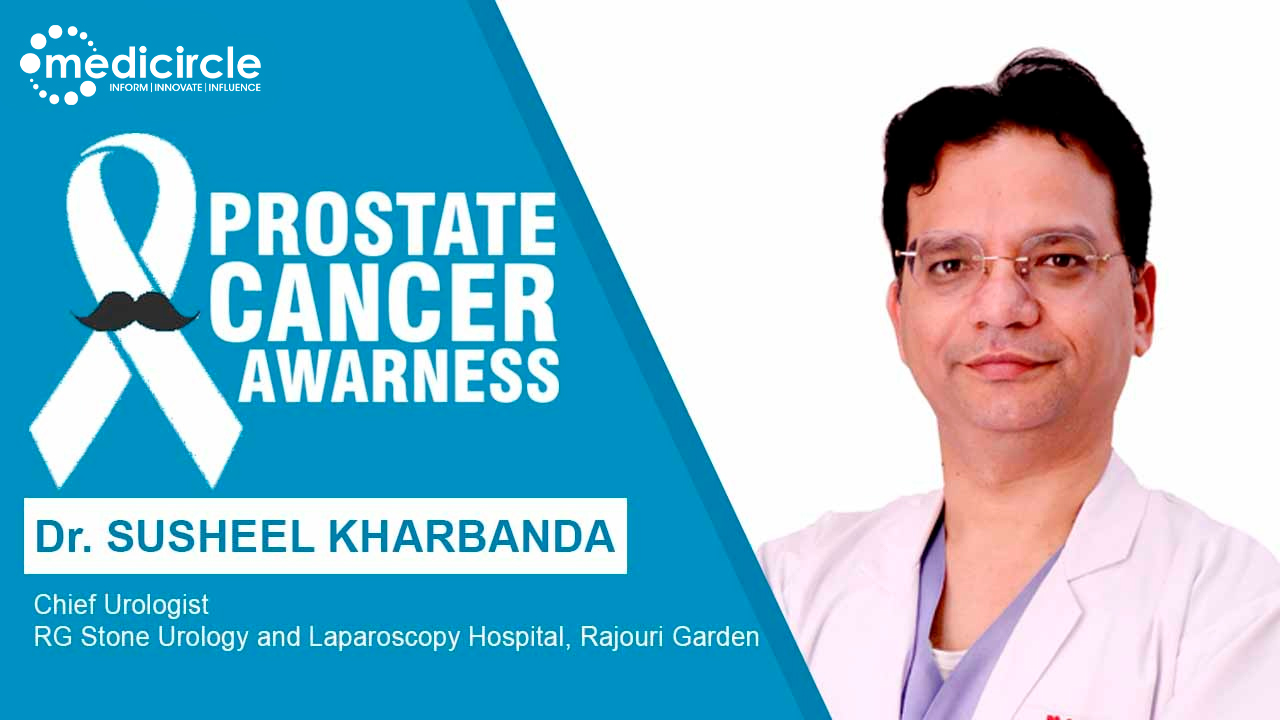Dr. Susheel Kharbanda works at RG Stone Hospital in Delhi. He has performed over 10 thousand endourological surgeries so far. He has completed his MBBS and MS from SMS Medical College, Jaipur. He did his DNB Urology from PD Hinduja Hospital, Mumbai. Dr. Kharbanda has received Robotic Surgery from Sharjah.
All you need to know about Prostate cancer
Dr. Susheel Kharbanda says, “Prostate cancer is the commonest cancer found in males worldwide. After lung cancer, it is the commonest cancer. As compared to other countries, In India, prostate cancer is generally found at a later stage and diagnosed at a later stage due to lack of awareness about it. There is generally a late diagnosis of this cancer as there are no symptoms at the initial stages. After the age of 50 years, all men should go for a routine check-up with their urologist. The diagnosis can be done by a urologist-
Physical pre-rectal examination PSA test above 4 Biopsy MRI scan PET PSA based scan Urinary symptoms Blood in urine Blood in semen Bone pain
Causes of Prostate cancer
Dr. Susheel Kharbanda informs, “All cancer formed in the body are idiopathic with unknown origin with no specific causes. Other causes of prostate cancer-
Genetic
Environmental
Dietary - high-fat diet
Age above 50 + years
Family history - get an early check-up at age 45+
Late detection - early detection can be manageable and cured
Prevention of Prostate cancer
Dr. Susheel Kharbanda states, “The cause is idiopathic hence we do not know how to stop and avoid prostate cancer completely. There are some preventative measures -
A healthy diet with fruits and vegetables Healthy diet over Dietary Supplements Exercise 6 days a week Control and manage weight An annual check-up for above 45 + years Healthy lifestyle
Different stages of prostate cancer
Dr. Susheel Kharbanda says, “All cancers are divided into staging and grading. Staging of cancer means the level of spread of cancer. Grading means the rate at which cancer cells multiply. The three stages of prostate cancer are -
Stage 1 - Localized and confined to the prostate gland Stage 2 - Prostate cancer affected the surrounding tissues like seminal vesicles, lymph nodes - Locally advancer Stage 3 - Metastasis of cancer to bones
Management of Prostate cancer and Strong follow up is a must
Stage 1 -Curative treatment with Robotc radical prostate surgery Stage 2 - Surgery and Radiation along with hormonal management Stage 3 - There is no cure. Manageable treatment can be given.”
(Edited by Dr.Rati Parwani)

 Dr. Susheel Kharbanda gives importance to early detection and screening of cancer especially in cases of prostate cancer. He also mentions the grading and staging of cancer with perfect management to treat and cure it.
Dr. Susheel Kharbanda gives importance to early detection and screening of cancer especially in cases of prostate cancer. He also mentions the grading and staging of cancer with perfect management to treat and cure it.





.jpg)


.jpeg)




.jpg)






.jpeg)





.jpg)




.png)



